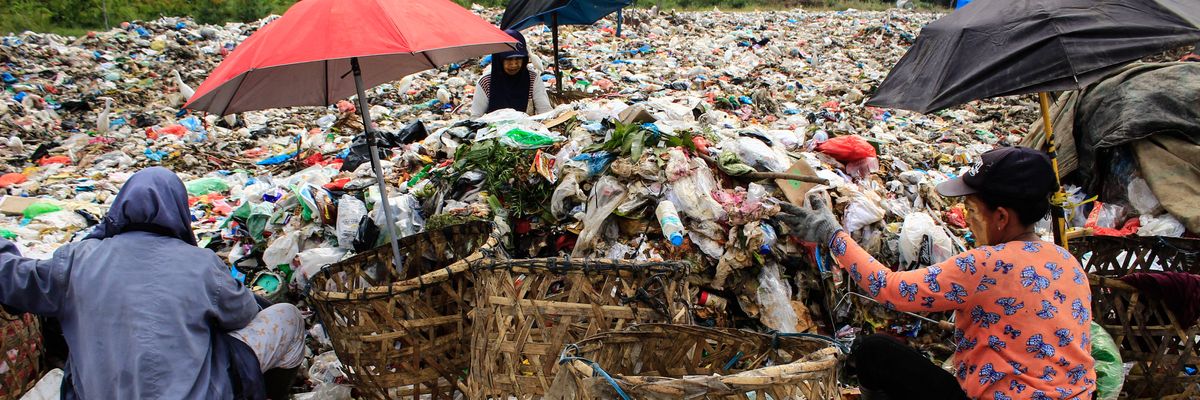A report released Thursday estimates that countries worldwide are on pace to generate 220 million tonnes of total plastic waste this year, a finding that comes as governments are set to convene in Ottawa, Canada later this month to hash out a binding global treaty to limit the toxic pollution that is inundating waterways and communities across the planet.
The new report from EA – Earth Action (EA) projects that Plastic Overshoot Day—the point at which the amount of plastic waste produced exceeds the capacity of global management systems—will arrive on September 5 this year. Over a third of the total plastic waste created this year will end up in nature, according to the analysis.
On average, each person globally contributes 28 kilograms of plastic pollution per year. Previous research has shown that just 20 companies are responsible for more than half of the world's total single-use plastic waste.
"The findings are unequivocal; improvements in waste management capacity are outpaced by rising plastic production, making progress almost invisible," EA co-CEO Sarah Perreard said in a statement Thursday, criticizing the "assumption that recycling and waste management capacity will solve the plastics crisis."
That assumption has been peddled for decades by the fossil fuel industry, which has a major interest in thwarting attempts to curb the production, use, and waste of plastics. Nearly all plastic is made from chemicals sourced from fossil fuels.
Sian Sutherland, co-founder of A Plastic Planet, said the new report underscores that "plastic pollution has set humanity on the road to ecological and humanitarian disaster."
"We have a narrow window of opportunity this year to create a global plastics treaty that will protect not only our ocean, our air, our soil but our own children," said Sutherland. "The question for every government now is this—will you negotiate a treaty to protect the health of your people; or will you negotiate a treaty to protect the profits of the fossil fuel industry? Viable solutions are already available at scale, giving us materials and systems that work in harmony with nature, not against it."
"Close to 50% of the world's population currently lives in areas where waste generated has already exceeded the capacity to manage it."
Late last year, the third round of U.N. plastics treaty talks ended without a breakthrough as major oil-producing countries such as Saudi Arabia obstructed the proceedings, the fossil fuel industry worked to sabotage the negotiations, and the U.S. declined to forcefully push for a global pact that meaningfully curtails plastics production.
The U.S. is among the world's leading generators of plastic waste, producing nearly 100 kilograms per capita each year. The U.S. and other rich nations also export tremendous amounts of plastic waste around the world, undercutting efforts to tackle the pollution crisis.
A Greenpeace International survey released earlier this month found that two-thirds of the U.S. public wants a global plastics treaty that bans single-use plastic packaging. A separate poll commissioned by WWF and the Plastic Free Foundation showed that 88% of global citizens support banning "unnecessary single-use plastic products" such as shopping bags.
In an op-ed for Euronews Green on Thursday, Perreard of EA wrote that "whilst policy has been mooted, schemes devised, and initiatives launched, plastic has continued to rise, and our planet and its people have sat under an ever-darkening cloud of pollution that showers its toxic consequences upon us."
"Close to 50% of the world's population currently lives in areas where waste generated has already exceeded the capacity to manage it, with the figure projected to rise to 66% by 5 September," Perreard noted. "With the fourth round of negotiations in Ottawa at the end of this month, we can no longer ignore the facts, we can no longer afford to resist the change that should be set in motion through the treaty."

